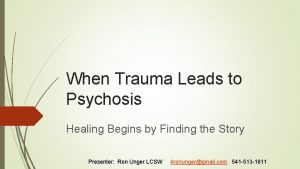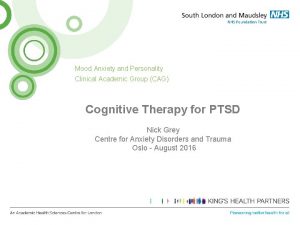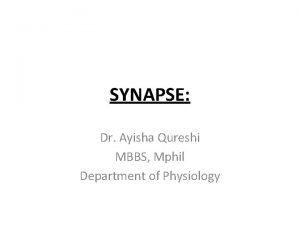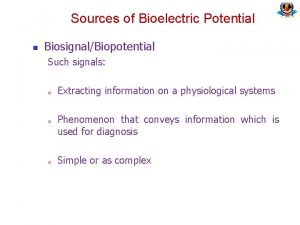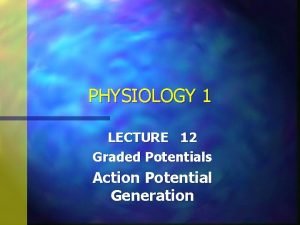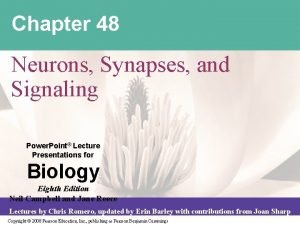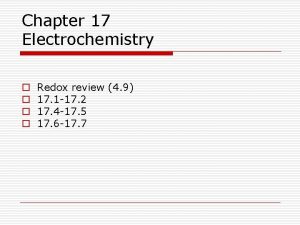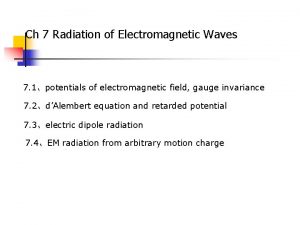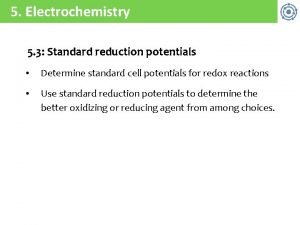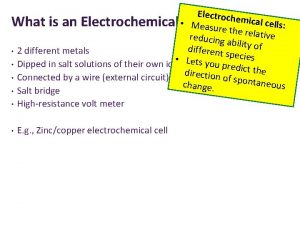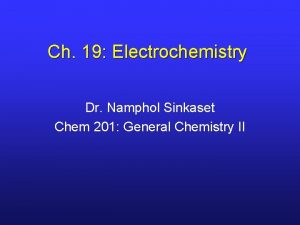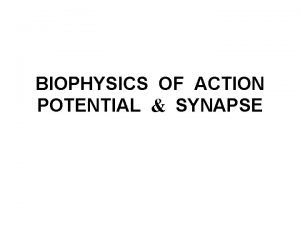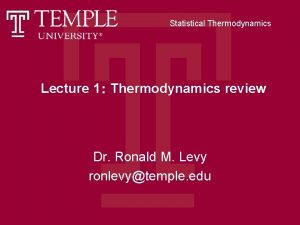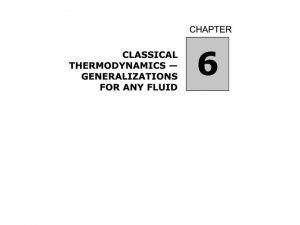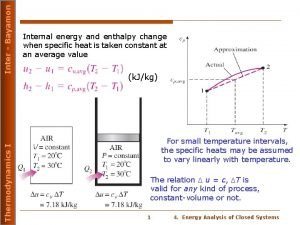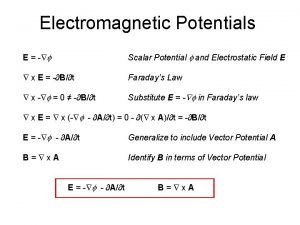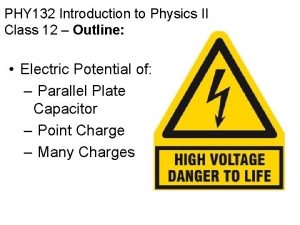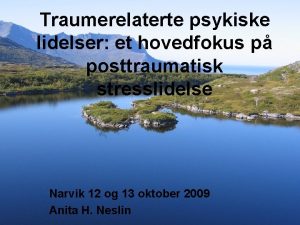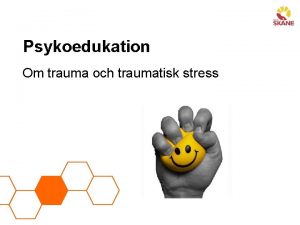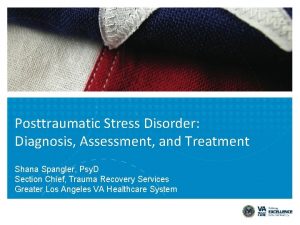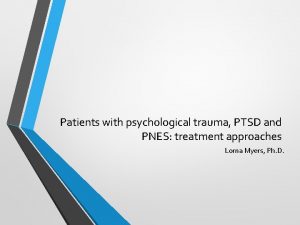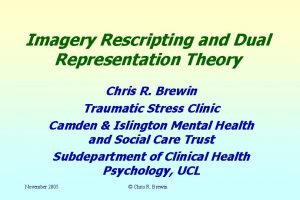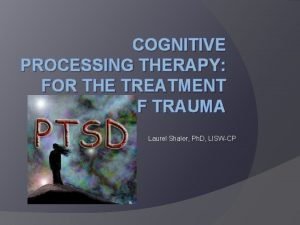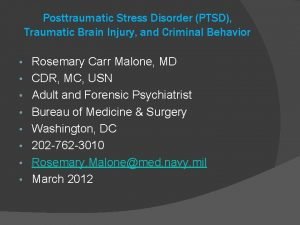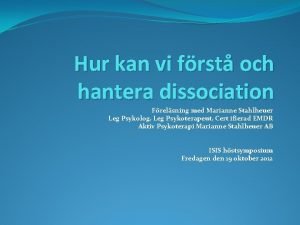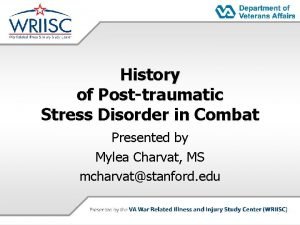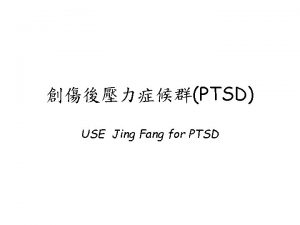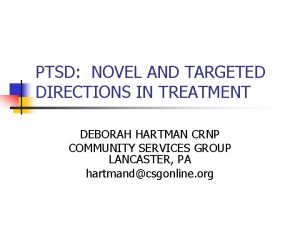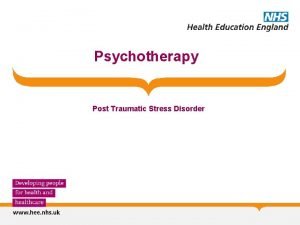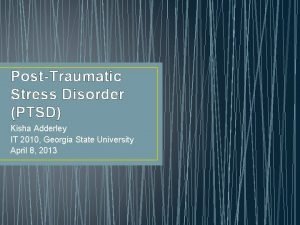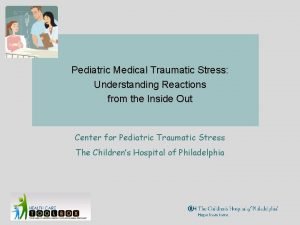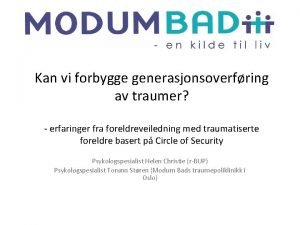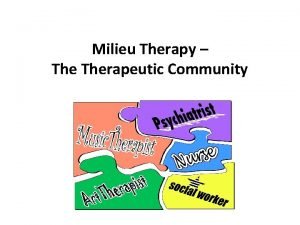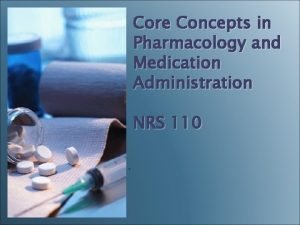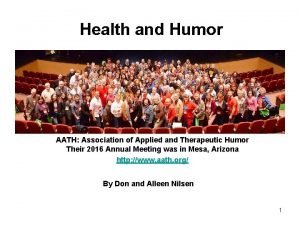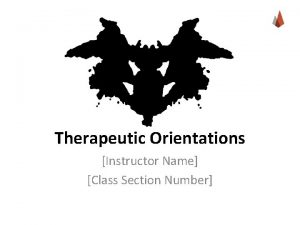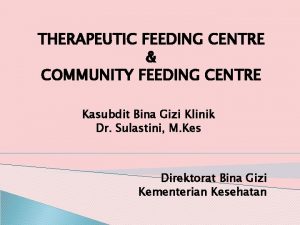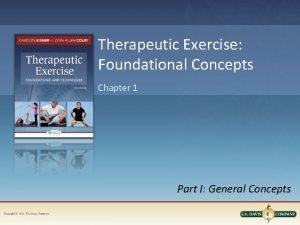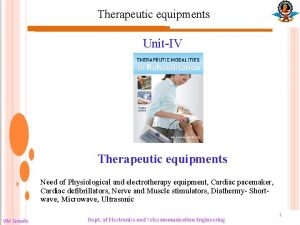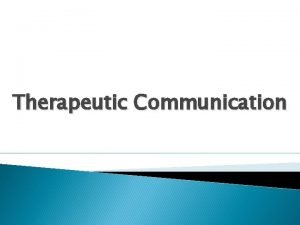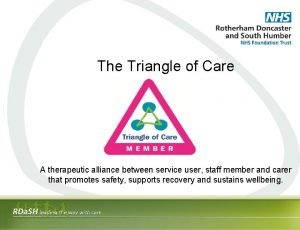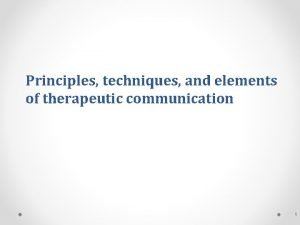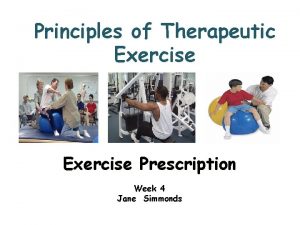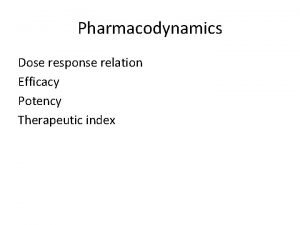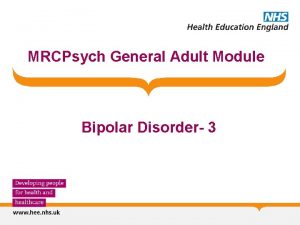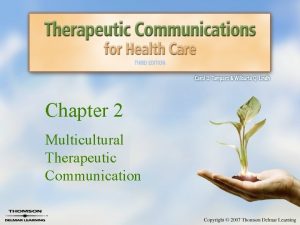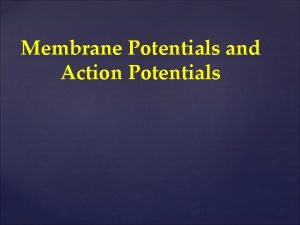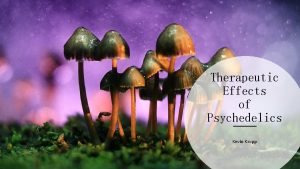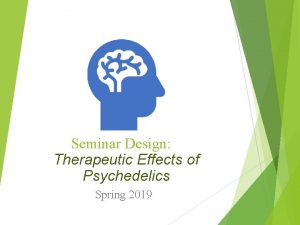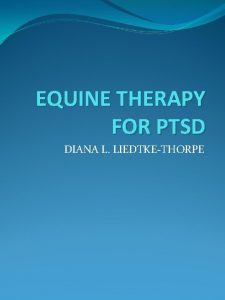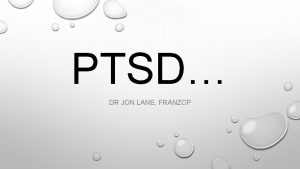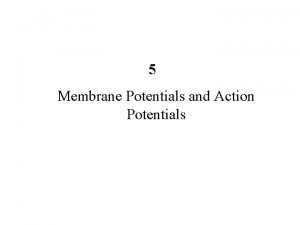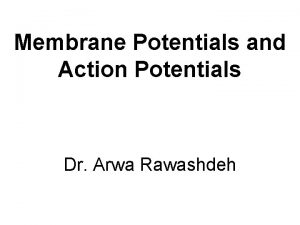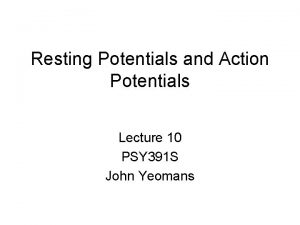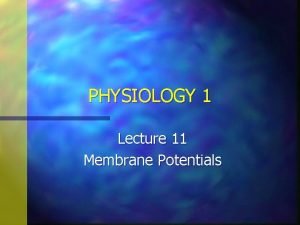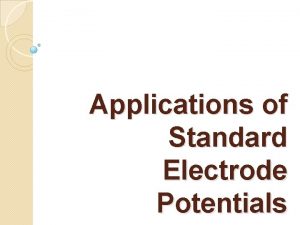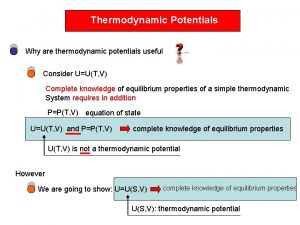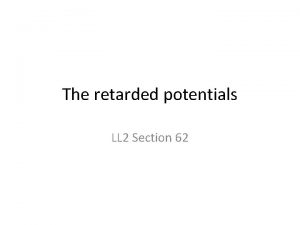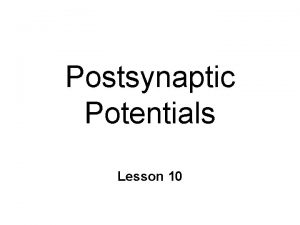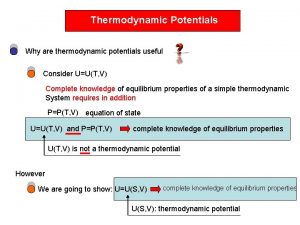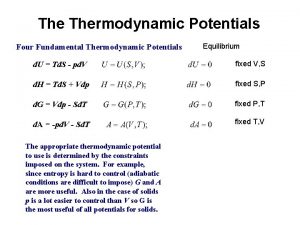Psychedelics and their therapeutic potentials in PTSD treatment



























































- Slides: 59

Psychedelics and their therapeutic potentials in PTSD treatment Eric Graack

Post Traumatic Stress Disorder (PTSD) • Debilitating anxiety condition lasting at least one month that manifests after directly or indirectly experiencing a traumatic event • Traumatic events can include: • • physical or sexual assault injury combat-related trauma natural disaster or death https: //www. fireengineering. com/articles/2016/01/im-a-firefighter-with-ptsd-now-what. html

Symptomology • re-experiencing the traumatic event • avoidance of reminders of the traumatic event • sleep disorders/nightmares • intrusive/disturbing thoughts • negative changes in mood and cognitions • hyperarousal • often comorbid w/ m. TBI, depression, anxiety, substance abuse and/or schizophrenia https: //www. verywellmind. com/requirements-for-ptsd-diagnosis-2797637

Brain networks implicated • Amygdala • Hippocampus • Decreased dentate gyrus and CA 3 volume in PTSD populations • Prefrontal cortex • Anterior and posterior cingulate cortex • Thalamus • Insula • Claustrum • Striatum Herrold (2014)

Current treatment options (limited) • Cognitive behavioral therapy (CBT) – most effective in acute PTSD (< 1 month) • Cognitive processing therapy (CPT) – re-exposure/cognitive restructuring • Repeated transcranial magnetic stimulation (r. TMS) – for comorbidities • SSRIs with psychiatric therapy (psychopharmacotherapy) – long term • Yet a treatment resistant population still exists

Psychedelic Alternatives • Animal studies using administration of psychoactive drugs following induced trauma have shown promising behavioral improvements in attention, anxiety, memory, and fear extinction. • Few of these prospects have moved to clinical trials, and results are promising. Treatment resistant populations have shown improvements with controlled psychedelic drug therapy in tandem with psychotherapy. • Ketamine and MDMA specifically seem to be the psychedelic drug of choice in psychopharmacotherapy for treatment resistant individuals.


Background/Methods • SD and WKY rats – model avoidance/anxiety behavior • WKY rats more resistant to avoidance extinction compared to SD rats • models PTSD/antidepressant treatment resistant clinical population • Avoidance/acquisition phase (12 sessions) • Avoidance measured by lever press after sound • Escape measured by lever press after shock • Failure if lever not pushed after 20 shocks • Extinction phase (6 sessions) • Ketamine (NMDAR antagonist) or saline i. p. then extinction training (no foot shock or safety signal). Ketamine responder and non-responder groups determined • Extinction retest phase (1 session) • Drug free, 3 weeks after final extinction session, same conditions as extinction session • E-Phys 2 weeks following retest • Hippocampus area of interest – decreased LTP in anxiety conditions

Figure 1

Figure 1

Figure 1

Figure 2

Figure 2

Figure 3

Figure 3

Figure 4

Discussion/Take Away • Ketamine facilitates extinction of avoidance behavior in anxiety-vulnerable rats • This has been shown in humans as well • However, ketamine responder and non-responder populations exist • Antidepressant response due to ketamine metabolite HNK increasing Glu. A 1, Glu. A 2, & BDNF synthesis in Hipp, not PFC • Ketamine facilitated hippocampal LTP in WKY responder rats, humans too? • specifically affects the medial entorhinal cortex to dentate gyrus pathway through the medial perforant pathway • WKY and PTSD hippocampus have less inhibitory neurons, study GABA?


Methods/Background • Idea is to use MDMA during fear-extinction to cause memory reconsolidation • Want to see if adult male Long Evans rats respond the same as mice in previous lit. • Translates to PTSD better • Fear Conditioning • Context A 3 mins, then 10 s auditory CS followed by foot shock US (4 x) • Amount of freezing measured fear response • Fear Extinction & Memory • Both at 24 hrs and 7 days following conditioning, saline or MDMA administration 30 mins prior to training • Context B plus auditory CS followed by no foot shock US (20 x) • Also reconditioned in Context A for 15 mins for contextual fear extinction • Fear Renewal • Context B or Context C for 3 mins then auditory CS followed by foot shock US (20 x) • Memory reactivation and reconsolidation • Both at 24 hrs and 7 days following conditioning, saline or MDMA administered after Context B reexposure • Context B for 3 mins the single auditory CS

Figure 1

Figure 1

Figure 1

Figure 1

Figure 1

Figure 2

Figure 2

Figure 2

Figure 2

Figure 3

Figure 3

Figure 3

Figure 3

Figure 4

Figure 4

Figure 4

Figure 4

Figure 4

Figure 5

Figure 5

Figure 5

Figure 5

Figure 5

Discussion/Take Away • Dose dependent extinction response to MDMA • Inverse relationship – more MDMA, less freezing in less time • MDMA administration during auditory CS fear extinction training has no impact on fear renewal or contextual fear extinction memory retrieval • However, MDMA administered during fear memory reconsolidation reduces later fear expression • All together this means MDMA seems to have the most therapeutic effect if administered during the fear extinction learning process • Emphasizes patients be encouraged to attend to traumatic memories, rather than structured, exposure-based strategies, ultimately triggering recall & reconsolidation of traumatic memories w/o facilitating their extinction


Methods/Background • Randomized, double-blind, dose-response phase 2 clinical trial • Patients with CAPS-IV score of 50+ assigned to 30, 75, or 125 mg MDMA dose • MDMA administered orally in two 8 hr sessions w/ concomitant psychotherapy • Blind broken, patients receiving 30 and 75 mg doses then received three 100125 mg MDMA-assisted psychotherapy sessions • Parameters measured during, 1 month, and 12 months following MDMAassisted psychotherapy sessions

Demographics

Demographics




Reactions

1 Month Follow Up

12 Month Follow Up

CAPS-IV

BDI-II

PSQI

Discussion/Take Away • Higher controlled doses of MDMA are more effective at decreasing PTSD severity • If initial dose is not enough, subsequent higher dosing can also be effective at decreasing PTSD severity • Many adverse events were reported during MDMA-assisted psychotherapy, so monitoring by a trained professional is vital for treatment tolerance • Both time and drug had a significant effect, but neither a control group (no trauma) nor true placebo (0 mg MDMA) was used. Does this affect the validity of results?

Final Thoughts/Closing Remarks • Anxiety related psychoses like PTSD are often comorbid with other disorders and can be treatment resistant • MDMA & Ketamine are two psychedelic drugs showing promise for PTSD treatment, are fast acting, and should be taken in tandem with closely monitored psychotherapy • Understanding the mechanisms behind these disorders and how drugs affect them is essential for developing effective treatment strategies both at a molecular and global level • Animal models can be the stepping stones for clinical trial by helping to unravel molecular mechanisms at play • Few clinical trial do exist, but are essential forwarding the field of study on psychedelic assisted psychotherapy for anxiety related conditions

tio ns Ques ? tions ? ? ns tio es es t s e Qu Qu Qu ? s ion Questions? ? s n o i t Ques tions Qu ? ? s n o i t s e
 Psychosis and ptsd
Psychosis and ptsd Ptsd model ehlers and clark
Ptsd model ehlers and clark Function of synapse
Function of synapse Source of bioelectric potential is dash in nature
Source of bioelectric potential is dash in nature Decremental graded potential
Decremental graded potential Graded potential vs action potential
Graded potential vs action potential Postsynaptic potentials
Postsynaptic potentials Standard reduction potential table
Standard reduction potential table Lienard-wiechert potentials
Lienard-wiechert potentials Standard cell potentials
Standard cell potentials Task 8 electrode potentials answers
Task 8 electrode potentials answers Use the tabulated half-cell potentials to calculate
Use the tabulated half-cell potentials to calculate What are electrical synapses
What are electrical synapses Explain helmholtz electrical double layer
Explain helmholtz electrical double layer Maxwell's relations thermodynamics
Maxwell's relations thermodynamics Measurable quantities
Measurable quantities Difference between internal energy and enthalpy
Difference between internal energy and enthalpy Scalar magnetic potential
Scalar magnetic potential An electron follows the trajectory shown from i to f
An electron follows the trajectory shown from i to f Ptsd symptomer
Ptsd symptomer Macbeth obsession quotes
Macbeth obsession quotes Psykoedukation ptsd
Psykoedukation ptsd Va ptsd rating scale pdf
Va ptsd rating scale pdf Ptsd seizures
Ptsd seizures Dual representation theory
Dual representation theory Ptsd spiritual warfare
Ptsd spiritual warfare Cpt impact statement worksheet
Cpt impact statement worksheet Probably armed possibly not analysis
Probably armed possibly not analysis Ptsd violent behavior
Ptsd violent behavior Komplex ptsd dissociation
Komplex ptsd dissociation Evolution of ptsd
Evolution of ptsd Ptsd
Ptsd Jamal and deborah therapy
Jamal and deborah therapy Cptsd.
Cptsd. Causes of ptsd
Causes of ptsd Ptsd stages
Ptsd stages Kompleks ptsd trigger
Kompleks ptsd trigger Circumcision ptsd
Circumcision ptsd Mileu therapy
Mileu therapy 7 rights of medication administration in order
7 rights of medication administration in order Association for applied and therapeutic humor
Association for applied and therapeutic humor Two families both alike in dignity
Two families both alike in dignity Therapeutic orientations
Therapeutic orientations Penyakit masyarakat sasaran bintibluh
Penyakit masyarakat sasaran bintibluh Therapeutic exercise chapter 1 mcqs
Therapeutic exercise chapter 1 mcqs Microwave diathermy block diagram
Microwave diathermy block diagram Therapeutic drift
Therapeutic drift Introduction of therapeutic communication
Introduction of therapeutic communication Triangle of care
Triangle of care Therapeutic story writing
Therapeutic story writing Principles of therapeutic communication
Principles of therapeutic communication Principle of therapeutic exercise
Principle of therapeutic exercise Potency vs efficacy
Potency vs efficacy High therapeutic index
High therapeutic index Therapeutic index
Therapeutic index Classification of therapeutic exercise
Classification of therapeutic exercise Intentional in relationships
Intentional in relationships 5 healthcare pathways
5 healthcare pathways Reproductive cloning process
Reproductive cloning process Chapter 2 multicultural therapeutic communication
Chapter 2 multicultural therapeutic communication
